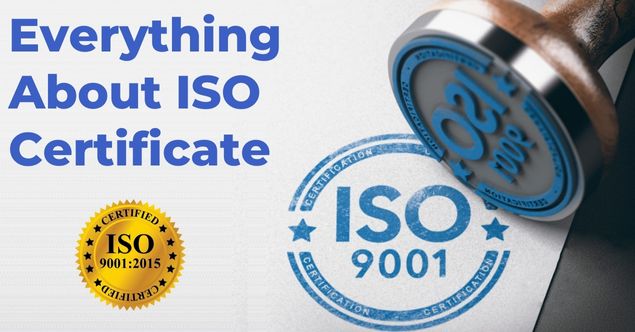ISO certification benefits all organizations regardless of their size, whether large or small firms. ISO is a nongovernmental organization that develops standards for products and services, quality, safety, and effectiveness.
Thus, ISO is an important accomplishment for each venture. ISO is a worldwide organization responsible for establishing various global quality management standards.
It includes standards bodies representing different countries that design and publish a massive range of exclusive, industrial and commercial standards. ISO standards cover every industry from healthcare to technology, manufacturing, safety and the environment. The ISO plays an important role in facilitating world trade by establishing common standards.
What is ISO certification?
ISO certification is a seal of approval from a third-party organisation that a company works to one of the international standards developed. The ISO are an independent, non-governmental international organisation that brings together experts to share knowledge and develop international standards and regulations that support innovation and provide solutions to global challenges.
With the increasing competition among the business, it is important to deliver high-quality goods & services in order to sustain itself in the market. ISO certification helps to provide your business credibility as well as the overall efficiency of the business.
ISO certification benefits:
- International credibility: ISO Certification plays an important role in helping the organisation to build credibility in overseas business.
- Customer Satisfaction: ISO standards are intended to make a business to serve their customers in a better way that would simultaneously increase customers satisfaction.
- Government Tenders: ISO Certification is quite important to bid for Government regulation.
- Business Efficiency: Functional efficiency of the venture is improved by obtaining ISO Certification. SOP (Standard Operating Procedures) and work instructions can be developed with the help of the ISO Certification Agency.
- Product Quality: By obtaining ISO Certification, the product quality matches international standards, and it will reduce the risk of product order rejections that may occur due to flawed products and services.
- Marketability: ISO Certification improves business credibility, and it helps business marketing directly.
How to get ISO Certification in India?
Step 1: Select the type of ISO Certification
There are types of ISO certification available such as:
ISO 9001:2008- Quality Management System
OHSAS 18001 – Occupational Health & Safety Management System
ISO 37001 – Anti-bribery management systems
ISO 31000 – Risk Management
ISO 27001 – Information Security Management System
ISO 10002 – Compliant Management System
ISO 14001:2015 – Environment Management System
ISO 26000 – Social Responsibility
ISO 28000 – Security Management
ISO 22008 – Food Safety Management
SA 8000 – Social accountability
EnMS EN 16001 ISO 50001 – Energy Management
SO/IEC 17025 – Testing and calibration laboratories
SO 13485 – Medical devices
ISO 639 – Language codes
ISO 4217 – Currency codes
ISO 3166 – Country codes
ISO 8601 – Date and time format
ISO 20121 – Sustainable events
SO/IEC 27001 – Information security management
Step 2: Select an ISO Certification Body
Take note that ISO itself does not offer certification to the businesses. Certification is done by external bodies. It is very important that you select a recognized and credible certification body. While selecting the ISO registrar, keep the following in mind:
Evaluate various ISO Certification service providers.
Check if they are following the CASCO standards which is the ISO committee that works on matters relating to conformity assessment. Check whether it is accredited or not compulsory but they must meet the needs of ISO Accreditation bodies.
Step 3: Create an application /contract
The applicant and the registrar should agree on a contract or agreement. This contract usually defines the rights and obligations of both parties which include liability issues, confidentiality, and access rights.
Step 4: Quality Documents Review
The ISO auditor will view all your quality manuals and documents related to various policies and procedures being followed in the venture. A review of existing work will help the ISO auditor to identify the possible gaps against the needs stipulated in the ISO standards.
Step 5: Make an Action Plan
After the ISO auditor communicates the existing gaps in your venture, you should prepare an action plan to fill these gaps. Prepare a list of the required tasks to bring the desired changes to your venture. You may need to train your employees to work efficiently while adapting to new procedures. Make all the employees aware of the ISO standards in terms of work efficiency and quality standards of the venture.
Step 6: Initial Certification Audit
The initial certification audit is divided into two categories-
Stage 1: The ISO auditor will audit the changes made by you in the venture. They will then try to identify the possible non-conformities in your systems and procedures to the desired quality management system.
They will divide these non-conformities into minor and major non-conformities for your venture. The applicant must carefully assess all these non-conformities and get them aligned as per the desired quality standards via modification in the techniques and processes used by the organisation.
Stage 2: After all the needed changes are done in the venture, the ISO auditor does the final auditing. The auditor will check whether all the non-conformities have been remove or not as per ISO quality standards. If the ISO auditor is satisfied, they will need the final ISO audit report and forward it to the registrar.
Step 7: Completing the ISO Certification
After all, non-conformities are addressed and all the findings are put in the audit report, the registrar will grant you the ISO certification for your venture.
Step 8: Surveillance Audits
A surveillance audit is basically conducted to ensure that ISO quality and standards are being maintained by your venture. It is conducted from periodly.
Step 9: Cost involved in the ISO Certification process
The cost of getting ISO certification is not fixed and may vary from ventures.
The ISO certification agency calculates the cost of ISO certification separately for each venture after considering different parameters such as-
Number of employees
Number of Processes
Level of risk associated with the scope of services of the venture.
The complexity of the management system
The number of working shifts etc.
Step 10: Time involved in the ISO Certification process
The Time taken in completing the whole process of ISO certification also varies from the venture. Normally, the time required to complete the process of ISO certification is around months:
Small organisations: 6-8 months
Medium organisations: 8-12 months
Large organisation: 12-15 months
Steps to check the validity of an ISO certificate
Go to the IAF website and choose IAF Members and Signers from the drop-down menu.
Select the right nation to find that which you are looking for. A new page is displayed with information on the national accrediting venture.
Where the identity of the accreditation body on the ISO certificate is not on the list of accreditation bodies in which country you belong to, the ISO certificate shall be void and of no effect.
Verification by the certification body that issued the certificate may be done on the accreditation body’s website. If the names are not listed on the accreditation body’s website, it is not certified, making the certificate illegitimate in the venture.
If the name of the certified venture appears on the website, this means that the venture is authorized. However, the accreditation body’s Web site may also be used to verify the certificate’s authenticity.
If the accreditation authority has no official documents needed, they may be sent by post to determine the authenticity of the ISO certificate.
If there is no online database or Accreditation Committee response, you can go e-mail [email protected] and [email protected] .
Summary
ISO (International Organization for Standardization) as the name implies it’s an independent international company that develops International Standards, such as ISO 9001 and ISO 14001, but they are not involved in the ISO certification.
External certification organisations in India perform the ISO certification process. In this article, we have maintained that the ISO Certification thing should be known.
FAQ's on ISO Certification:
- Bureau Veritas.
- Tuv Nord.
- TuvSud.
- BSI.
- TuvRheinland.
The Ministry of MSME has adopted a Quality Management System (QMS, ISO 9001:2015) for its manage in Udyog Bhawan, New Delhi as per the directives of the Cabinet Secretariat.
ISO certification certifies that a management system, manufacturing process, service, or documentation procedure has all the needs for standardization and quality assurance.




